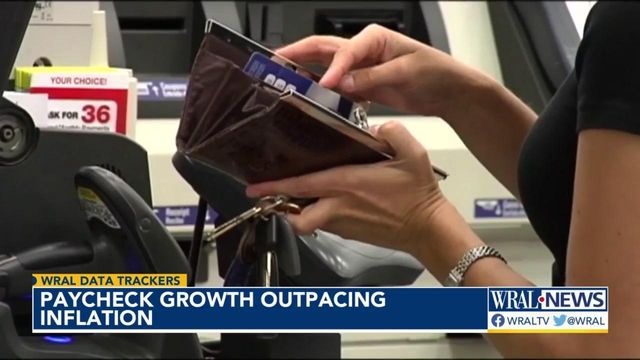At least for people in North Carolina, salaries are increasing faster than inflation
North Carolina residents continue having strong purchasing power or how many things you can afford to buy with your paycheck. How long that'll last, though, is unclear.
Posted — UpdatedAs a result, U.S. dollars aren’t going nearly as far compared to a month ago and certainly not a year ago.
"One way to potentially understand the impact of rising prices is to compare those increases to how well workers are doing," said Dr. Mouhcine Guettabi, an economist at UNC Wilmington.
Guettabi is talking about purchasing power or how many things Americans can afford to buy with their paychecks.
"If the price of eggs or the price of things that you buy on a regular basis increases by 10%, for example, and your wages only increased by 5%, then that means you have less money to buy the things that you want," he explained.
"Which means, at least right now, the average person [in North Carolina] is better off today, even after taking the price increases into account than they were a year ago," Guettabi said.
That’s not the story on the national level, though. Overall, the average American's wage increased by only 5.5%.
Guettabi feels North Carolina's economy is faring better for a few reasons, like the types of jobs offered and the state's growing population.
"It's hard to imagine that would all come to a halt," he said. "North Carolina was growing really fast pre-pandemic and it's recovered relatively quickly. It has not recovered all the jobs that it lost during the pandemic, but it's basically recovered a lot of them."
The data shows that some sectors are faring better than others. It includes industries such as construction, leisure and hospitality. While those working in health care, education and information services are still seeing raises, they're less than the inflation rate.
The data also shows that, because many people are changing jobs or careers, they have the power. It shows most of those who are seeing the raises and higher wages are new hires.
This all matters because purchasing power affects every aspect of economics, from what we buy to how we invest. When it decreases due to inflation, there can be serious negative economic consequences, including rising costs of goods and services – like what we’re seeing now – and that contributes to a higher cost of living.
Economists like Guettabi are forecasting an economic slowdown, but believe North Carolinians are in ok shape. There’s uncertainty though about how long that’ll last.
"The increases in wages may start to slow down and if inflation stays elevated, then that purchasing power will start to erode," he said. "Meaning that the average person's ability to buy the same basket of goods or to shop for the same things will become compromised."
Related Topics
• Credits
Copyright 2024 by Capitol Broadcasting Company. All rights reserved. This material may not be published, broadcast, rewritten or redistributed.





